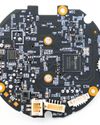
A Computer Numerical Control or CNC machine is a computer-controlled device that uses pre-programmed software to cut, shape, and create parts and prototypes. In this article, Matthew demonstrates how to use a small CNC milling machine at home to make a simple two-sided PCB, using KiCad, CopperCAM, and Candle software.
A Computer Numerical Control (CNC) machine is controlled by a computer and uses preprogrammed software to cut and shape parts and prototypes. They are used with Computer Aided Design (CAD) and Computer Aided Manufacture (CAM) software.
In this article I describe my workflow for manufacturing a simple, two-sided printed circuit board from a blank piece of copperclad FR4, using a Genmitsu 3018 PROVer V2 CNC milling machine [1].
Why, in the age of cheap PCB production, would anyone take the time to mill out their own PCB at home? I asked myself this question a few times during this project.
I don't suggest that it is practical to mill a fully functional PCB that has a complex design at home, one with many vias, or component footprints with finely spaced surface mount pads. Some artisans do manage to do this and I credit them for it. However, modifying a complex PCB design so that it retains the board outline, mounting holes, and footprints required for the board connectors does not take long, and allows us to manufacture a "looks like" prototype that enables us to check two things:
That the PCB fits inside the intended case correctly.
That any connectors on the board align correctly with the openings in the case.
For this article, I milled a complete, twosided PCB that connects to a LILYGO T-Embed module [2] using 0.1" spaced header pins.
This story is from the January 2025 edition of Circuit Cellar.
Start your 7-day Magzter GOLD free trial to access thousands of curated premium stories, and 9,000+ magazines and newspapers.
Already a subscriber ? Sign In
This story is from the January 2025 edition of Circuit Cellar.
Start your 7-day Magzter GOLD free trial to access thousands of curated premium stories, and 9,000+ magazines and newspapers.
Already a subscriber? Sign In

New TI MCUs Enable Edge AI and Industry-Leading Real-Time Control to Advance Efficiency, Safety, and Sustainability
Texas Instruments (TI) introduced two new series of real-time microcontrollers that deliver advancements to help engineers achieve more intelligent and secure processing in automotive and industrial applications.

Using Amazon Alexa to Control Custom IoT Gadgets
In part two of his article, Brian describes integrating custom IoT gadgets with Amazon Echo using emulation to receive spoken alarms. In part one, he used emulation and Arduino Cloud services as a middleman.

Holiday Hangover Hardware Hacking
Having too much cheer during the holidays? In this month's article, Colin offers a diversion from the jolly season by urging developers to retreat to the basement to brush up on hardware hacking skills. He shows how a low-cost Raspberry Pi Pico and a TP-Link Tapo C200 smart IP camera could become the next automated bird deterrent or a home automation server.

Datasheet: Microamps Per Megahertz Ultra-Low Power MCUs Minimize Current Consumption
How do chip makers differentiate if many ultra-low power MCUs on the market feature the same processor core? The peripherals and different power states offer various ways to manage current consumption down to microamps per megahertz.

Smart Home Lock Down Matter Provides Security Blanket
As more devices in the smart home connect to the Internet, they become increasingly vulnerable to outside attacks. Developers can now add the latest security measures to their Smart Home devices through Matter.

Basic Pulse Circuits
In part one of a three-part series, Wolfgang wrote how basic pulse circuits help digital circuits, such as embedded boards with ARM processors, deal with pulse trains or bursts of pulses from the outside. In Part 2, he dives into enabling flip-flops, timing parameters, and synchronization, design tasks needed to capture, detect, and filter pulses.

Building a Wi-Fi Router Watchdog
Dev created a watchdog for a Wi-Fi extender using a Raspberry Pi Pico. This monitors Wi-Fi connectivity for his smart home lighting system, which would require a reset twice a year due to rapid power interruptions.

Create Your Own PCBs with a CNC Milling Machine
Using KiCad, CopperCAM, and Candle Software

Performance Bottlenecks in Embedded Linux Solutions Analysis, Identification, and Mitigation
Good performance is a requirement for every technology, and system designers rely on operating systems to ensure fast and smooth transitions in critical applications. Fortunately, Pedro writes, the embedded Linux OS offers ways for finding, analyzing and mitigating performance bottlenecks so embedded systems can deliver the speed and efficiency that end users expect.

Renesas New RA8 Entry-Line MCU Groups Brings High Performance of Arm Cortex-M85 Processor to Cost-Sensitive Applications with Market-Leading CoreMark Performance
Renesas Electronics Corp., a premier supplier of advanced semiconductor solutions, introduced the RA8E1 and RA8E2 microcontroller (MCU) groups, extending the industry's most powerful series of MCUs.